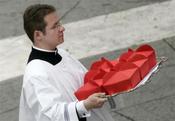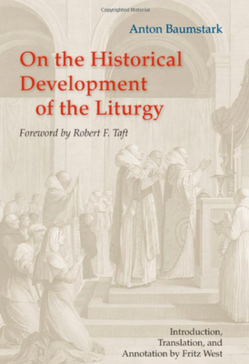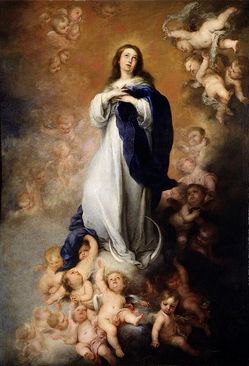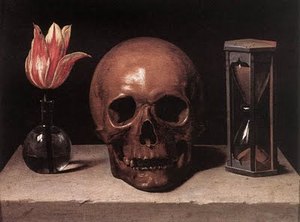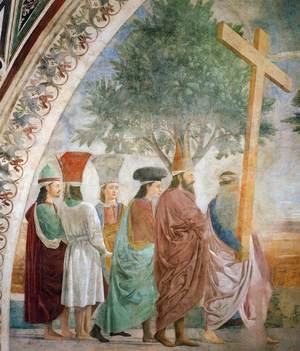“As confessors we are called to show mercy and
hope, to be fathers more than judges, to take on the penitent’s pain and listen
with much patience,” Cardinal Raymond Burke told CNS correspondent Carol Glatz.
Category: Sacred Liturgy & Sacraments
Changes in creating new cardinals 2012
Baptism of the Lord, no ordinary feast
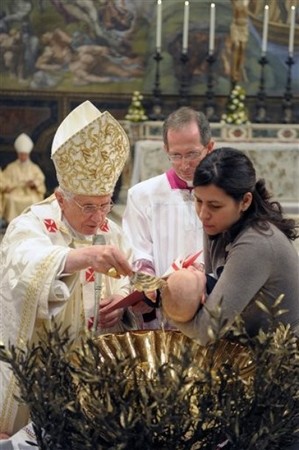 Today the Church in the US celebrates the Feast of the
Today the Church in the US celebrates the Feast of the
Baptism of the Lord, in 2012, the day after the Solemnity of the Epiphany. In other places, like Rome, the Church observed the Baptism of the Lord yesterday as the Epiphany was celebrated on the traditional 12th day of Christmas,
January 6. Today’s feast reminds us that being a Christian is the joy of being “children of God.” During his noontime Angelus Address Pope Benedict said that “God is the origin of the existence of every creature and the Father in a unique way of every human being: He has a unique, personal relationship with him or her.”
At Mass in Rome earlier in the morning the Pope had baptized 16 newborn infants, children of Vatican employees in the Sistine Chapel.
Anton Baumstark: On the Historical Development of the Liturgy
The decision to publish this book in English is exceptional. Anton Baumstark is a pivotal figure in 20th century liturgical studies and widely considered a genius. He set the world on fire for his keen understanding of the sacred Liturgy, both of the East and the West as he offers a lens –a method– for understanding historical (organic) development in the Tradition of the Church. Baumstark keeps the reader grounded in asking the questions which keep us close to the theologia prima, the sacred Liturgy. The serious student in liturgical studies will pay close attention to On the Historical Development of the Liturgy and Comparative Liturgy.
The Forward is written by Archimandrite Robert F. Taft, SJ, from whom I was first introduced to Anton Baumstark.
From the publisher, Liturgical Press:
Anton Baumstark’s On the Historical Development of the Liturgy (1923) complements his classic work, Comparative Liturgy. Together they lay out his liturgical methodology. Comparative Liturgy presents his method; On the Historical Development of the Liturgy offers his model.
This book was written for one audience and valued by another. Written to lead adherents of the nascent German liturgical movement to a deeper religious appreciation of Catholic worship, its methodology and scope have won the appreciation of liturgical specialists for nearly a century. In describing the organic growth of the liturgy, its shaping and distortion, Baumstark’s reach extends from India to Ireland, Moscow to Axum, Carthage to Xi’an. He discusses the influences of language, literature, doctrine, piety, politics, and culture. While his audacity can be breathtaking and his hypotheses grandiose, his approach is nevertheless stimulating. In this annotated edition, Fritz West provides the first English translation of this work by Anton Baumstark.
Trained in classical and oriental philology, Anton Baumstark (1872-1948) was prodigious as a scholar studying the literature, art, and liturgy of the whole church–Oriental, Eastern, and Western. Comparative liturgy, his method for studying the historical development of the liturgy as an organism, has had a lasting influence, notably on the liturgical study of the Christian East. Fritz West, a liturgical scholar ordained in the United Church of Christ, has written numerous articles on liturgical methodology, the three-year lectionary, and worship in his Reformed tradition. He has published two books, The Comparative Liturgy of Anton Baumstark and Scripture and Memory: The Ecumenical Hermeneutic of the Three-Year Lectionaries.
Why is the Immaculate Conception important?
What did we hear today from the sacred Liturgy about the Immaculate Conception of the Blessed Virgin Mary? How close to did you pay attention to the priest praying the Mass prayers on your behalf? What’s the import of the feast? To know the answers we have to look at the texts of today’s Liturgy. Did you notice when the priest prayed:
1. God preserved Mary from every stain of sin by foreseeing the death of His Son Jesus, and so we pray too, that is, we hope to be cleansed of sin and admitted to communion with Him;
2. we profess belief in God’s prevenient grace given to Mary and we hope that He will deliver us from sin;
3. in the Preface, the priest prays that in Mary who was “endowed with the rich fullness of your [God’s] grace … [there is] a worthy Mother for your Son and [which] signify the beginning of the Church; As Pope Benedict said today, “Mary, on the other hand,” he continued, “is Immaculate, free from all stain of sin. The Church is holy, but at the same time marked by our sins.”
4. in her yes to God’s invitation to be the Mother of Jesus, we have the “Lamb would wipe away our offenses”;
5. we pray that the singular grace given to Mary may also be given to us.
This Liturgy is a mix of liturgical, dogmatic and systematic theology. BTW, this is fitting way to celebrate the graces given to our nation.
Joseph Ratzinger’s “The pastoral approach to marriage should be founded on truth”
From a little known text by Cardinal Joseph Ratzinger published in 1998
The pastoral approach to marriage should be founded on truth
Concerning some objections to the Church’s teaching on the reception of Holy Communion by divorced and remarried members of the faithful
In 1998 Cardinal Joseph Ratzinger, Prefect of the Congregation for the Doctrine of the Faith, introduced the volume entitled “On the Pastoral Care of the Divorced and Remarried,” published by the Libreria in the CDF’s series (“Documenti e Studi”, 17). Because of its current interest and breadth of perspective, we reproduce below the third part along with the addition of three notes. The text was published today by L’Osservatore Romano.
The Letter of the Congregation for the Doctrine of the Faith of 14 September 1994 concerning the reception of Holy Communion by divorced and remarried members of the faithful was met with a very lively response across wide sections of the Church. Along with many positive reactions, more than a few critical voices were also heard. The fundamental objections against the teaching and practice of the Church are outlined below in simplified form.
Several of the more significant objections – principally, the reference to the supposedly more flexible practice of the Church Fathers which would be the inspiration for the practice of the Eastern Churches separated from Rome, as well as the allusion to the traditional principles of epicheia and of aequitas canonica – were studied in-depth by the Congregation for the Doctrine of the Faith. Articles by Professors Pelland, Marcuzzi and Rodriguez Luño 2, among others, were developed in the course of this study. The main conclusions of the research, which suggest the direction of an answer to the objections, will be briefly summarized here.
Continue reading Joseph Ratzinger’s “The pastoral approach to marriage should be founded on truth”
Benedict on music and Liturgy
Two central interests in the ministry of Pope Benedict are music and the sacred Liturgy; other interests you might say are evangelization, theology and culture. At recent gatherings with the Pope he spoke about music as a concert given by a group of Spanish musicians and then to the bishops of New York State making their pilgrimage to Rome to pray and speak with the Pope about their work. Below are two interesting sets of ideas worthy of reflection:
On music
“…the magic
worked by music, the universal language which can overcome all barriers and
allow us to enter the world of others, of a nation or a culture, at the same
time enabling us to turn our mind and hearts … to the world of God.”
Pope
Benedict XVI to musicians
November 26, 2011
On the sacred Liturgy
“A weakened sense of the meaning and importance of Christian
worship can only lead to a weakened sense of the specific and essential
vocation of the laity to imbue the temporal order with the spirit of the
Gospel. America has a proud tradition of respect for the Sabbath; this legacy
needs to be consolidated as a summons to the service of God’s Kingdom and the
renewal of the social fabric in accordance with its unchanging truth.”
All Souls
In Rome, Pope Benedict XVI spoke of this gesture of remembrance:
Today, the day after the Solemnity of All Saints, the Church invites us to pray for the faithful departed. This yearly commemoration, often marked by visits to the cemetery, is an occasion to ponder the mystery of death and to renew our faith in the promise of eternal life held out to us by Christ’s resurrection. As human beings, we have a natural fear of death and we rebel against its apparent finality. Faith teaches us that the fear of death is lightened by a great hope, the hope of eternity, which gives our lives their fullest meaning. The God who is love offers us the promise of eternal life through the death and resurrection of his Son. In Christ, death no longer appears as an abyss of emptiness, but rather a path to life which will never end. Christ is the resurrection and the life; whoever believes in him will never die. Each Sunday, in reciting the Creed, we reaffirm our faith in this mystery. As we remember our dear departed ones, united with them in the communion of the saints, may our faith inspire us to follow Christ more closely and to work in this world to build a future of hope.
Vespers for All Saints and a lecture “Art, Beauty and the Sacred” in NYC
The Catholic Artists Society is hosting a lecture on October 31st at 6:30pm titled “Art, Beauty and the Sacred” given by Oratorian Father Uwe Michael Lang. The evening will include the celebration of First Vespers of All Saints in the Church of Saint Vincent Ferrer (NYC). The flyer can be viewed here: Catholic Artists Society All Saints and lecture.pdf
Vespers
We will celebrate the ancient and beautiful liturgy of Solemn First Vespers for All Saints, officiated by our special guest, Father Uwe Michael Lang, C.O. Father Bruno Shah, O.P. from Saint Vincent Ferrer, and Father Michael Barone from the archdiocese of Newark, will assist in the liturgical celebration. Gregorian chant and polyphonic settings will be provided by a professional choir led by David J. Hughes, Organist & Choirmaster at Saint Mary’s Church, Norwalk, CT.
Continue reading Vespers for All Saints and a lecture “Art, Beauty and the Sacred” in NYC
Exaltation of the Holy Cross
Consummatum est. It is completed — it has come to a full end. The mystery of God’s love toward us is accomplished. The price is paid, and we are redeemed. The Eternal Father determined not to pardon us without a price, in order to show us especial favor. He condescended to make us valuable to Him. What we buy we put a value on. He might have saved us without a price –by the mere fiat of His will. But to show His love for us He took a price, which, if there was to be a price set upon us at all, if there was any ransom at all to be taken for the guilt of our sins, could be nothing short of the death of His Son in our nature. O my God and Father, Thou hast valued us so much as to pay the highest of all possible prices for our sinful souls– and shall we not love and choose Thee above all things as the one necessary and one only good?
Blessed John Henry Newman
Meditation on the 12th Station
